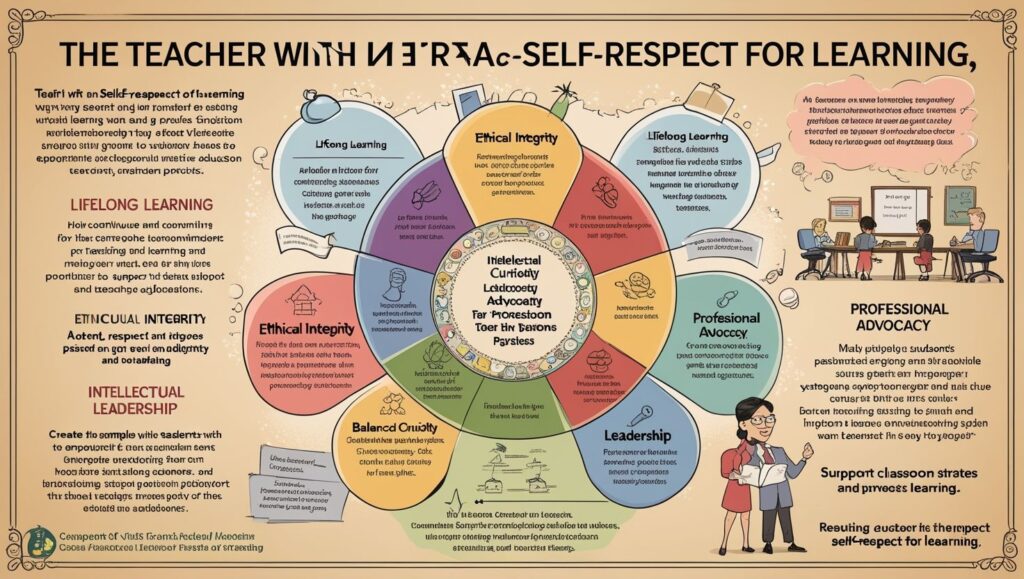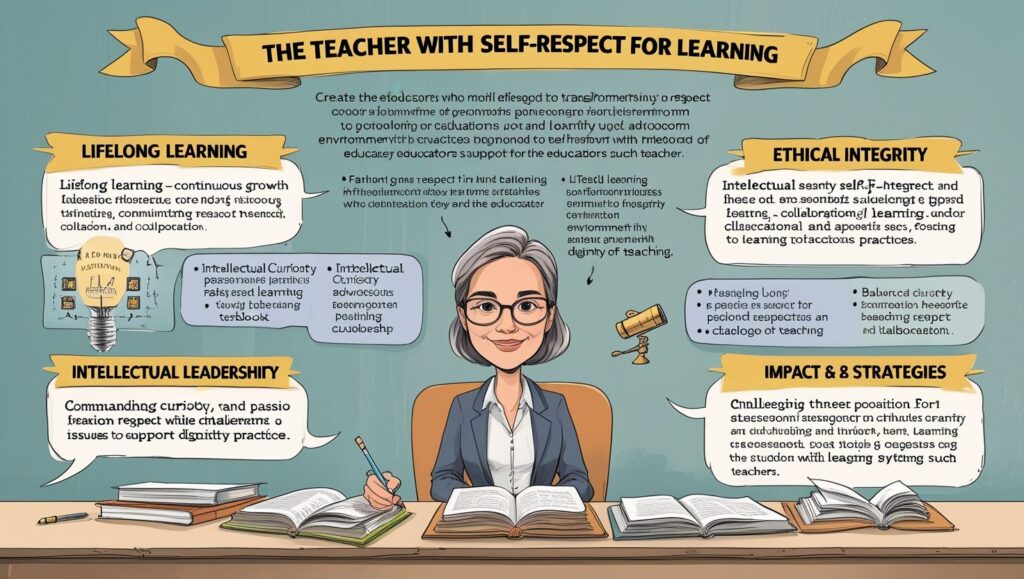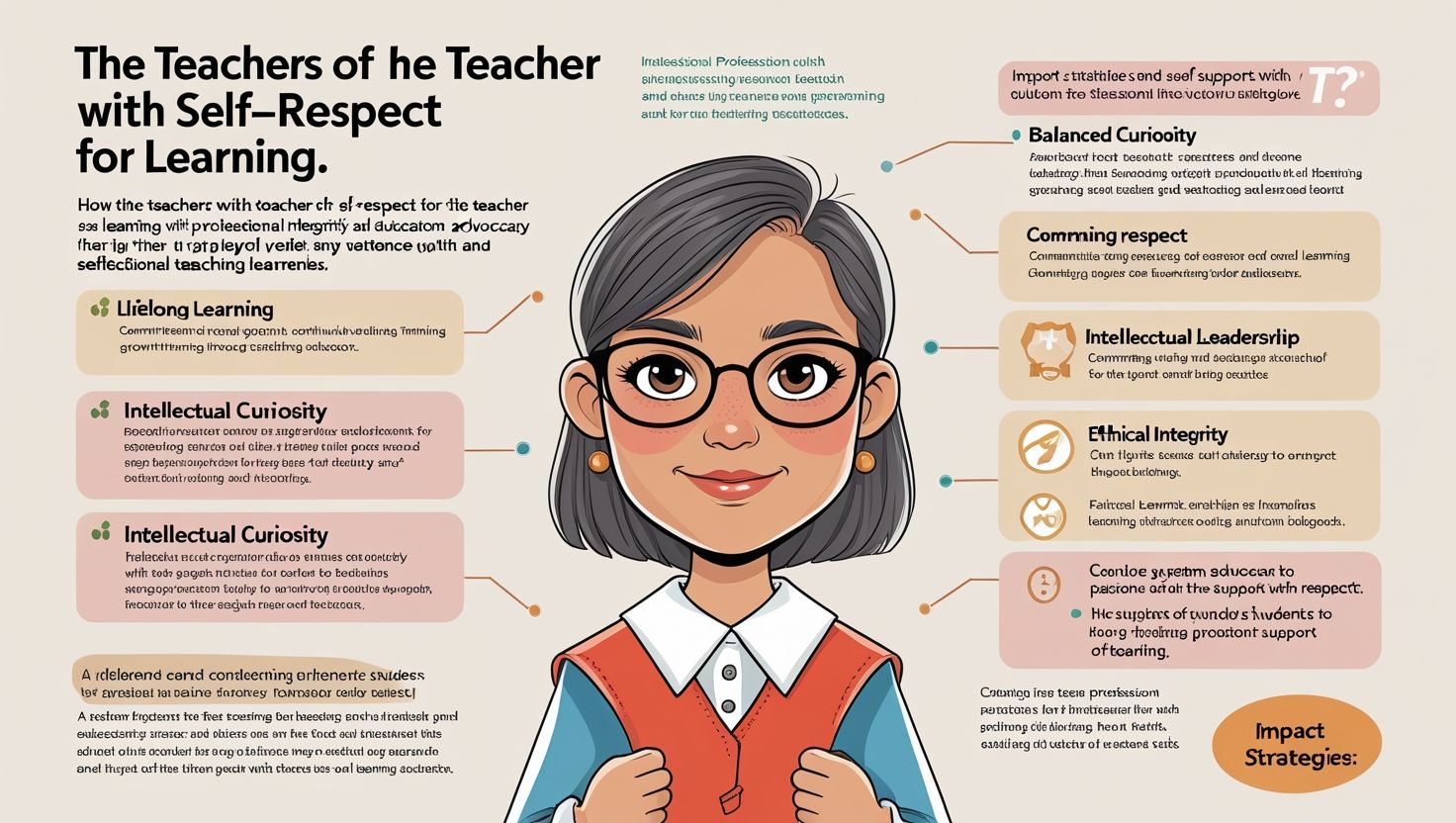Introduction
The Teacher with Self-Respect for Learning, A teacher with self-respect for learning is not merely an instructor but a lifelong learner who embodies intellectual curiosity, professional dignity, and ethical integrity. Such educators recognize that teaching is not just about transferring knowledge but also about modeling the values of discipline, humility, and continuous self-improvement. Self-respect in teaching means upholding one’s professional worth while fostering a respectful and engaging learning environment. Teachers who respect their own learning journey inspire students to adopt a similar mindset, creating a culture of mutual respect and academic excellence.
In today’s rapidly evolving educational landscape, where teachers often face bureaucratic pressures, societal undervaluation, and emotional burnout, maintaining self-respect becomes crucial. A self-respecting teacher does not compromise on ethical standards, remains committed to professional development, and advocates for the dignity of the profession. This article explores the significance of self-respect in teaching, its historical and philosophical foundations, key characteristics of such educators, and their impact on students and society. Additionally, it presents real-world examples, references from educational theorists, and critical questions to deepen the discourse on this vital subject. By understanding the role of self-respect in teaching, we can better appreciate how educators shape not only individual learners but also the future of society.
Background
The concept of a teacher with self-respect for learning has deep roots in educational philosophy. Ancient Greek thinkers like Socrates and Plato emphasized that a true educator must first be a perpetual student, engaging in self-reflection and intellectual humility. Confucian traditions also highlight the moral responsibility of teachers to cultivate both knowledge and virtue in themselves and their students.
In modern times, educational theorists such as John Dewey and Paulo Freire have reinforced these ideas. Dewey argued that teachers must be active learners to adapt to students’ evolving needs, while Freire’s Pedagogy of the Oppressed stressed that educators must resist authoritarianism and instead foster critical thinking and mutual respect. However, contemporary challenges—such as standardized testing, administrative micromanagement, and societal devaluation of teaching—often erode teachers’ self-respect.
Despite these obstacles, many educators worldwide continue to uphold their dignity through continuous learning, ethical teaching practices, and advocacy for the profession. Their self-respect is not just personal but also professional, influencing classroom dynamics, student motivation, and broader educational reforms. Understanding this background helps contextualize why self-respecting teachers are indispensable to meaningful education.

Main Ideas
1. Lifelong Learning as a Professional Ethic
A self-respecting teacher recognizes that education does not end with a degree but continues throughout one’s career. Such educators actively pursue professional development through workshops, conferences, online courses, and advanced certifications. They stay updated on pedagogical research, emerging technologies, and innovative teaching strategies to enhance their classroom effectiveness. For example, a math teacher might enroll in a course on AI-assisted learning tools to better engage digital-native students, while a literature teacher could participate in seminars on inclusive canon reform.
Peer collaboration is another crucial aspect—self-respecting teachers engage in professional learning communities (PLCs) where they share best practices, critique each other’s methods, and collectively solve classroom challenges. This commitment to growth not only sharpens their skills but also models intellectual humility for students, showing that even experts must keep learning. In countries like Singapore, where teachers are required to dedicate 100 hours annually to professional development, this ethic is institutionalized, resulting in globally recognized educational outcomes.
Ultimately, lifelong learning prevents stagnation, reinforces a teacher’s credibility, and demonstrates that education is a living, evolving process—not a static set of facts to be memorized.
2. Ethical Integrity in Pedagogy
A teacher’s self-respect is closely tied to their ethical conduct in the classroom. This means applying consistent, transparent grading rubrics; providing constructive feedback free from bias; and treating all students with fairness, regardless of background or personal rapport. For instance, a self-respecting teacher will not favor high-achieving students but instead invest extra time in supporting struggling learners, ensuring equitable opportunities for success.
Academic honesty is another cornerstone. Such educators refuse to tolerate plagiarism, gently but firmly guiding students toward original work. They also model integrity by citing sources meticulously in their own lectures and materials. In one notable case, a university professor publicly corrected her own error in a published paper, using it as a teachable moment about accountability.
Moreover, ethical teachers maintain professional boundaries—they avoid inappropriate relationships with students while still fostering mentorship. They respect confidentiality when handling sensitive student issues and advocate for policies that protect learners’ rights. This unwavering moral compass earns them deep respect from students, parents, and colleagues alike.
3. Role Modeling Intellectual Curiosity
Students mimic what they see, and a teacher who exhibits genuine enthusiasm for learning inspires them far more effectively than rigid syllabi or exam pressures. Self-respecting educators demonstrate curiosity daily—whether by sharing a recent documentary they watched, debating new scientific discoveries, or admitting when they don’t know an answer and researching it alongside students.
For example, a history teacher might redesign a lesson after visiting a museum exhibit, weaving fresh insights into the curriculum. A biology teacher could invite students to analyze real-world data from a recent study, bridging textbook concepts with cutting-edge science. Such practices show that learning is not confined to tests but is a lifelong adventure.
These teachers also encourage student-led inquiry, allowing learners to explore tangential questions or propose alternative projects. When a student asks, “Why does this matter?” the self-respecting teacher has a ready answer—connecting lessons to real-world problems, careers, or personal growth. This approach transforms passive recipients of knowledge into active, engaged participants.

4. Balancing Authority and Approachability
A self-respecting teacher commands respect without relying on fear or authoritarianism. They establish clear expectations and consistent discipline but remain open to dialogue. For instance, if a student challenges a grade, the teacher reviews it collaboratively—not defensively—acknowledging mistakes if warranted. This balance fosters mutual respect and critical thinking.
Such educators also create psychologically safe classrooms where students feel comfortable asking questions or making mistakes. A notable example is the “mistake celebration” technique, where teachers normalize errors as part of learning, saying, “Let’s see what we can learn from this.”
At the same time, they maintain professionalism, avoiding overly casual behavior that might undermine their role. The result is a classroom where authority is earned through competence and empathy, not imposed through intimidation—a space where students thrive academically and emotionally.
5. Advocacy for the Teaching Profession
Teachers with self-respect understand their value and refuse to accept systemic disrespect silently. They advocate for better pay, smaller class sizes, and curricular autonomy through unions, public commentary, or grassroots campaigns. For example, during the 2018–19 U.S. teacher strikes, educators successfully lobbied for increased funding, proving collective action’s power.
They also combat societal devaluation by spotlighting their expertise—writing op-eds, hosting community seminars, or mentoring new teachers. In Finland, teachers are treated as trusted professionals akin to doctors, a status upheld by their rigorous training and vocal advocacy.
By demanding fair treatment, these educators not only improve their own working conditions but also elevate the profession’s prestige, attracting talented future teachers and ensuring sustainable educational quality.
The Role of Lifelong Learning in Teacher Self-Respect
A teacher who values self-respect prioritizes continuous professional and intellectual growth. Unlike educators who rely solely on outdated methods, self-respecting teachers actively seek new knowledge through advanced degrees, certifications, and collaborative learning communities. For instance, Finland’s education system mandates ongoing teacher training, ensuring educators remain at the forefront of pedagogical innovation. Such commitment not only enhances teaching quality but also reinforces the teacher’s confidence and credibility.
Moreover, lifelong learning allows teachers to model adaptability—a crucial skill in today’s fast-changing world. When students see their teachers engaging with new technologies, research, or interdisciplinary approaches, they learn that education is a dynamic, lifelong pursuit rather than a static process. This mindset shift is critical in cultivating resilient, curious learners who value growth over rote memorization.
Ethical Integrity and Classroom Leadership
A self-respecting teacher maintains high ethical standards, ensuring fairness in assessments, transparency in communication, and respect for diverse student backgrounds. For example, a teacher who refuses to inflate grades despite external pressures demonstrates professional integrity, teaching students the value of honesty and hard work.
Additionally, such educators foster inclusive classrooms where every student feels valued. They address biases, challenge stereotypes, and create safe spaces for intellectual risk-taking. By upholding these principles, they not only earn students’ respect but also instill a sense of justice and equity—qualities essential for responsible citizenship.
References
- Dewey, J. (1938). Experience and Education. New York: Macmillan.
- Freire, P. (1970). Pedagogy of the Oppressed. New York: Continuum.
- Palmer, P. J. (1998). The Courage to Teach. San Francisco: Jossey-Bass.
- Noddings, N. (1984). Caring: A Feminine Approach to Ethics and Moral Education. Berkeley: University of California Press.
- Hattie, J. (2009). *Visible Learning: A Synthesis of Over 800 Meta-Analyses Relating to Achievement*. London: Routledge.
These works highlight the intersection of self-respect, ethical teaching, and lifelong learning, providing a theoretical foundation for this discussion.
Conclusion
A teacher with self-respect for learning is a transformative force in education. By embodying lifelong learning, ethical integrity, and professional advocacy, they elevate not only their own practice but also the entire learning ecosystem. Students taught by such educators develop a deeper appreciation for knowledge, critical thinking, and self-worth.
However, systemic support is essential—governments and institutions must provide fair wages, autonomy, and professional development opportunities to sustain teachers’ self-respect. When society values educators, the ripple effects extend beyond classrooms, fostering a more informed, ethical, and engaged citizenry. Ultimately, the self-respecting teacher is not just an instructor but a guardian of educational excellence and societal progress.
Key Questions
- How can schools foster a culture where teachers’ self-respect is prioritized?
- What policies can reduce burnout and increase professional dignity for educators?
- How does a teacher’s self-respect directly impact student motivation and self-esteem?
- What role do mentorship programs play in nurturing self-respecting teachers?
- How can teachers balance institutional demands with maintaining their ethical and intellectual autonomy?
These questions invite further exploration into creating environments where teachers thrive as respected professionals and lifelong learners.

Great insights! I really enjoyed how you explained this topic clearly and simply.
This is so helpful. I’ve been looking for a post like this—thank you!
Thanks for sharing superb informations. Your site is very cool. I am impressed by the details that you have on this website. It reveals how nicely you perceive this subject. Bookmarked this web page, will come back for extra articles. You, my pal, ROCK! I found just the info I already searched all over the place and just could not come across. What a great web-site.